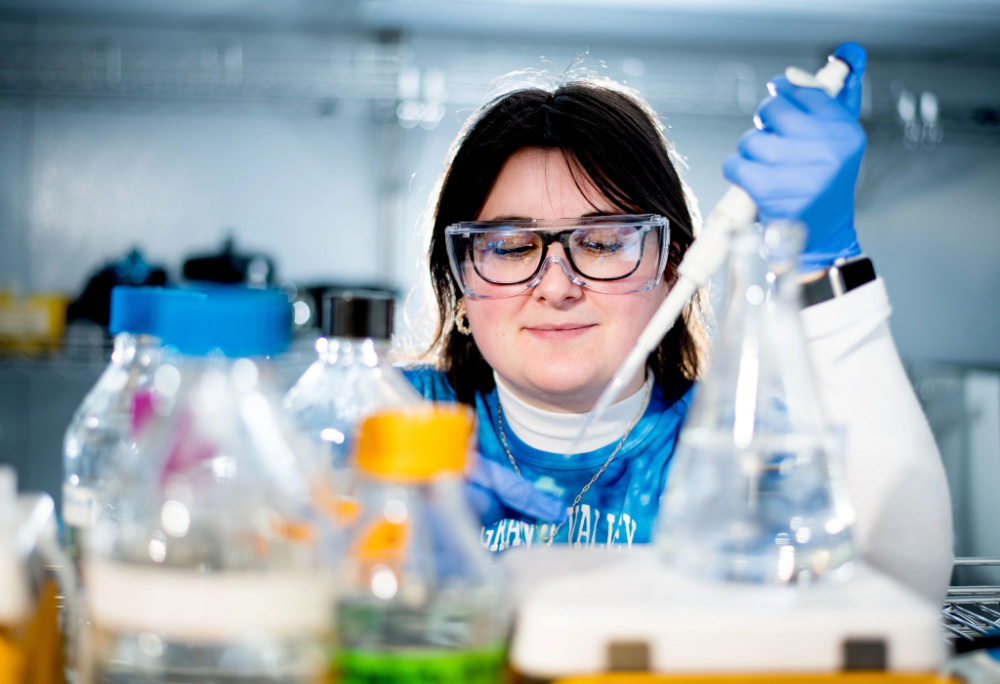Green Chemistry Undergraduate Certificate
Undergraduate Certificate
Allendale • Face to face • 13 Credits

Undergraduate Certificate
Allendale • Face to face • 13 Credits
Green chemistry focuses on understanding how chemicals affect human health and the environment. It constitutes the core chemistry contribution towards sustainability by guiding the design of chemicals and processes toward reducing or eliminating the use or generation of hazardous substances.
Grand Valley's Green Chemistry Undergraduate Certificate focuses on understanding how chemicals affect human health and the environment, guiding the design of chemicals and processes to reduce or eliminate hazardous substances. This certificate is a strong addition to your degree and can be completed face-to-face at Grand Valley's Allendale Campus.
The coursework for the Green Chemistry certificate requires 13 to 14 credits, including research and lab experience. Students will study topics such as synthetic polymers, environmental pollution, global environmental change, green chemistry for a sustainable environment, introduction to geochemistry, natural resource policy, and environmental and resource economics. This diverse range of courses ensures a comprehensive exploration of green chemistry concepts and sustainability.
This certificate offers unique advantages, including access to state-of-the-art laboratory equipment, one-on-one interaction with faculty members, and hands-on experience through internships and research opportunities with faculty and local businesses. The Chemistry Department has received recognition for its green chemistry education, and Grand Valley was among the first to sign the national Green Chemistry Commitment, ensuring graduates have proficiency in green chemistry. This certificate enhances students' degrees and resumes, making them more competitive in the job market.
For new students, visit the Admissions website for undergraduate requirements. Upon acceptance and for current students:
Chemistry Department
gvsu.edu/chem
312 Padnos
Hall
(616) 331-3317
[email protected]
Admissions and Recruitment Office
Study the chemical composition or physical principles of living cells and organisms, their electrical and mechanical energy, and related phenomena. May conduct research to further understanding of the complex chemical combinations and reactions involved in metabolism, reproduction, growth, and heredity. May determine the effects of foods, drugs, serums, hormones, and other substances on tissues and vital processes of living organisms.
Top skills| Annual Earnings | Percentile |
|---|---|
| $ 48,678.34 | 10% |
| $ 58,727.16 | 25% |
| $ 64,307.77 | 50% |
| $ 94,483.08 | 75% |
| $130,088.07 | 90% |
Conduct qualitative and quantitative chemical analyses or experiments in laboratories for quality or process control or to develop new products or knowledge.
Top skills| Annual Earnings | Percentile |
|---|---|
| $ 50,494.71 | 10% |
| $ 61,361.72 | 25% |
| $ 81,546.56 | 50% |
| $110,549.30 | 75% |
| $144,022.20 | 90% |
Teach courses pertaining to the chemical and physical properties and compositional changes of substances. Work may include providing instruction in the methods of qualitative and quantitative chemical analysis. Includes both teachers primarily engaged in teaching, and those who do a combination of teaching and research.
Top skills| Annual Earnings | Percentile |
|---|---|
| $ 46,403.94 | 10% |
| $ 60,063.83 | 25% |
| $ 85,727.91 | 50% |
| $122,846.65 | 75% |
| $165,905.37 | 90% |